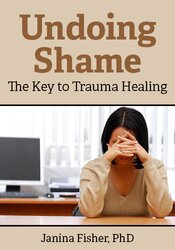Description
More than any other obstacle, shame can block the joy and peace traumatized clients seek in therapy. Feelings of worthlessness prevent them from metabolizing positive experiences. Rather than seeing their accomplishments and strengths as accurate reflections of who they are, shame sabotages their progress. Paradoxically, as clients get better in treatment, standing up for themselves more and reaching their goals, these shifts can evoke other forms of shame, like self-doubt and self-judgement. In this workshop, you’ll explore. You’ll explore how to:
- Understand and accept the role of shame in surviving traumatic events
- Undo negative beliefs rooted in traumatic events that fuel feelings of inferiority and unworthiness
- Connect with and move through feelings of shame to make space for more pride and self-love
CPD
Planning Committee Disclosure - No relevant relationships
All members of the PESI, Inc. planning committee have provided disclosures of financial relationships with ineligible organizations and any relevant non-financial relationships prior to planning content for this activity. None of the committee members had relevant financial relationships with ineligible companies or other potentially biasing relationships to disclose to learners. For speaker disclosures, please see the faculty biography.
CPD
This online program is worth 2 hours CPD.
Speaker
Janina Fisher, PhD, is a licensed clinical psychologist and former instructor at The Trauma Center, a research and treatment center founded by Bessel van der Kolk. Known as an expert on the treatment of trauma, Dr. Fisher has also been treating individuals, couples, and families since 1980.
She is the past president of the New England Society for the Treatment of Trauma and Dissociation, an EMDR International Association Credit Provider, Assistant Educational Director of the Sensorimotor Psychotherapy Institute, and a former Instructor, Harvard Medical School. Dr. Fisher lectures and teaches nationally and internationally on topics related to the integration of the neurobiological research and newer trauma treatment paradigms into traditional therapeutic modalities.
She is co-author with Pat Ogden of Sensorimotor Psychotherapy: Interventions for Attachment and Trauma (2015) and author of Healing the Fragmented Selves of Trauma Survivors: Overcoming Internal Self-Alienation (2017) and the forthcoming book, Working with the Neurobiological Legacy of Trauma (in press).
Speaker Disclosures:
Financial: Dr. Janina Fisher is an international expert and consultant on Trauma and Dissociation. She is a consultant for Khiron House Clinics and the Massachusetts Department of MH Restraint and Seclusion Initiative. Dr. Fisher receives royalties as a published author. She receives a speaking honorarium, recording royalties and book royalties from Psychotherapy Networker and PESI, Inc. Dr. Fisher has no relevant financial relationships with ineligible organizations.
Non-financial: Dr. Janina Fisher is on the advisory board for the Trauma Research Foundation. She is a patron of the Bowlby Center.
Additional Info
Access for Self-Study (Non-Interactive)
Access never expires for this product.
For a more detailed outline that includes times or durations of time, if needed, please contact cepesi@pesi.com.
Questions?
Visit our FAQ page at www.pesi.com/faq or contact us at www.pesi.com/info
Objectives
- Summarize the role of shame and self-loathing as symptoms of trauma.
- Identify the neurobiological effects of shame.
- Discriminate the physiological and cognitive contributors to chronic shame.
- Describe the survival advantages of shame.
Outline
The Role of Shame in Traumatized Individuals
- How shame supports the dorsal vagal or submission response
- Procedural learning of survival responses
- How shame can be adaptive in a dangerous environment
The Neurobiological Effects of Shame
- Flushing, gaze aversion, collapse, loss of speech
- How somatic symptoms of shame become belief systems
Survival “Advantages” of Shame
- Inhibiting behaviour that might elicit abuse
- How shame supports loyalty to family over self
- Shame as a non-threatening response to perpetrators
Interventions for Addressing Shame
- Developing a mindful relationship to the shame as implicit memory
- Cognitive re-structuring of shame as a survival response
- Treating the shame as a child part humiliated by an inner critic
Limitations of the research and potential risks
- Evaluating risk in use of mindfulness-based or cognitive restructuring techniques
- Identifying clients appropriate or inappropriate for these approaches
Target Audience
- Psychologists
- Physicians
- Nurses
- Counsellors
- Marriage and Family Therapists
- Addiction Counsellors
- Social Workers
Reviews
Overall:
4.8
Total Reviews: 31


 Online CourseFrank Anderson’s Master Class in Internal Family Systems Therapy£999.98Frank Anderson’s Master Class in Internal Family Systems Therapy29 Jan, 2024Frank Anderson’s Master Class in Internal Family Systems Therapy£999.98
Online CourseFrank Anderson’s Master Class in Internal Family Systems Therapy£999.98Frank Anderson’s Master Class in Internal Family Systems Therapy29 Jan, 2024Frank Anderson’s Master Class in Internal Family Systems Therapy£999.98 BookWritten by three leading experts in the fields of disordered eating, mental health, and trauma-informed care, this book will become your go-to guide for learning how to reject diet culture, heal your£18.99Written by three leading experts in the fields of disordered eating, mental health, and trauma-informed care, this book will become your go-to guide for learning how to reject diet culture, heal your20 Feb, 2024Written by three leading experts in the fields of disordered eating, mental health, and trauma-informed care, this book will become your go-to guide for learning how to reject diet culture, heal your£18.99
BookWritten by three leading experts in the fields of disordered eating, mental health, and trauma-informed care, this book will become your go-to guide for learning how to reject diet culture, heal your£18.99Written by three leading experts in the fields of disordered eating, mental health, and trauma-informed care, this book will become your go-to guide for learning how to reject diet culture, heal your20 Feb, 2024Written by three leading experts in the fields of disordered eating, mental health, and trauma-informed care, this book will become your go-to guide for learning how to reject diet culture, heal your£18.99









